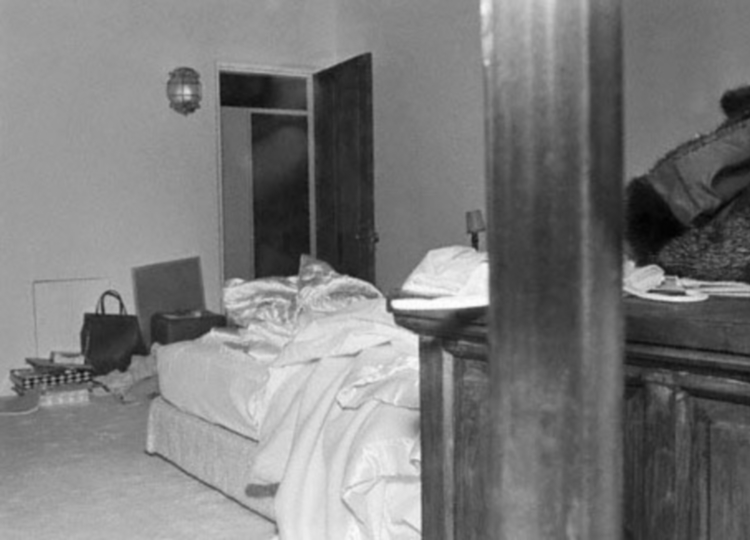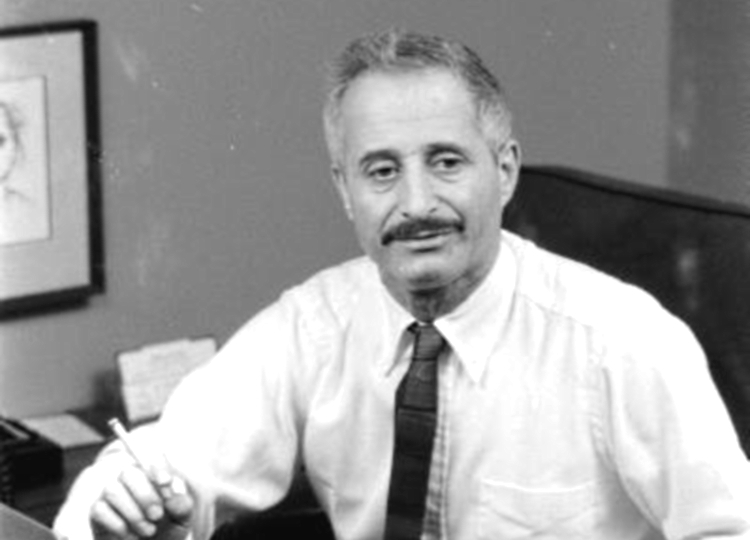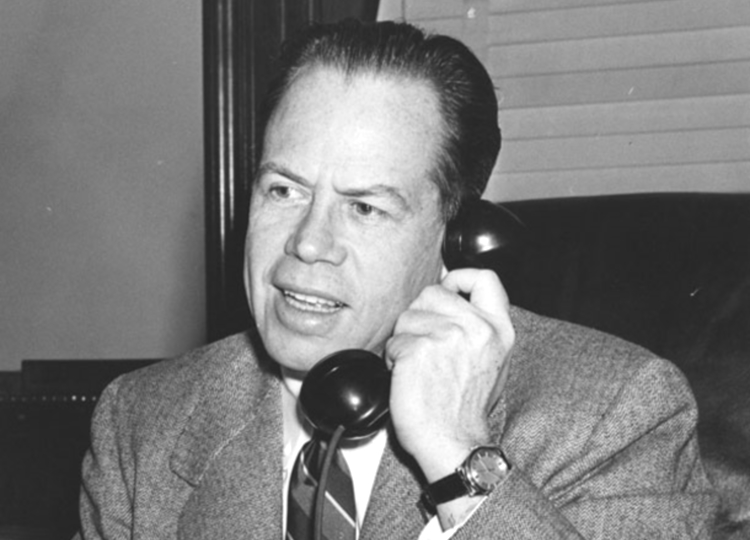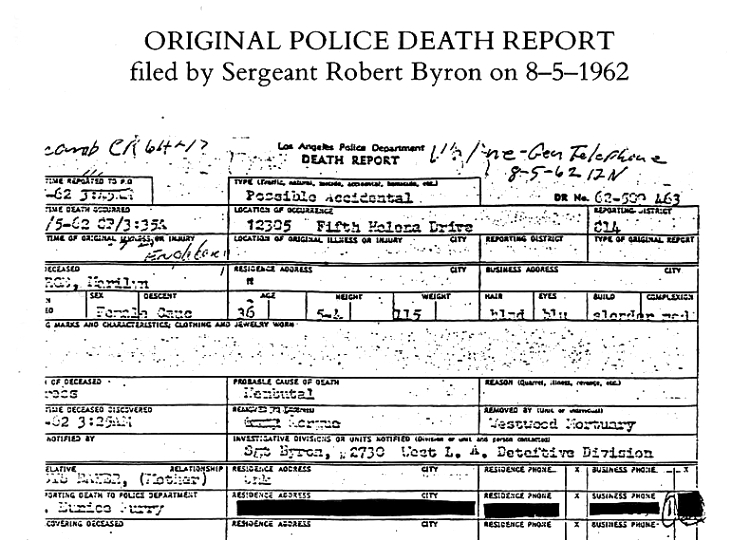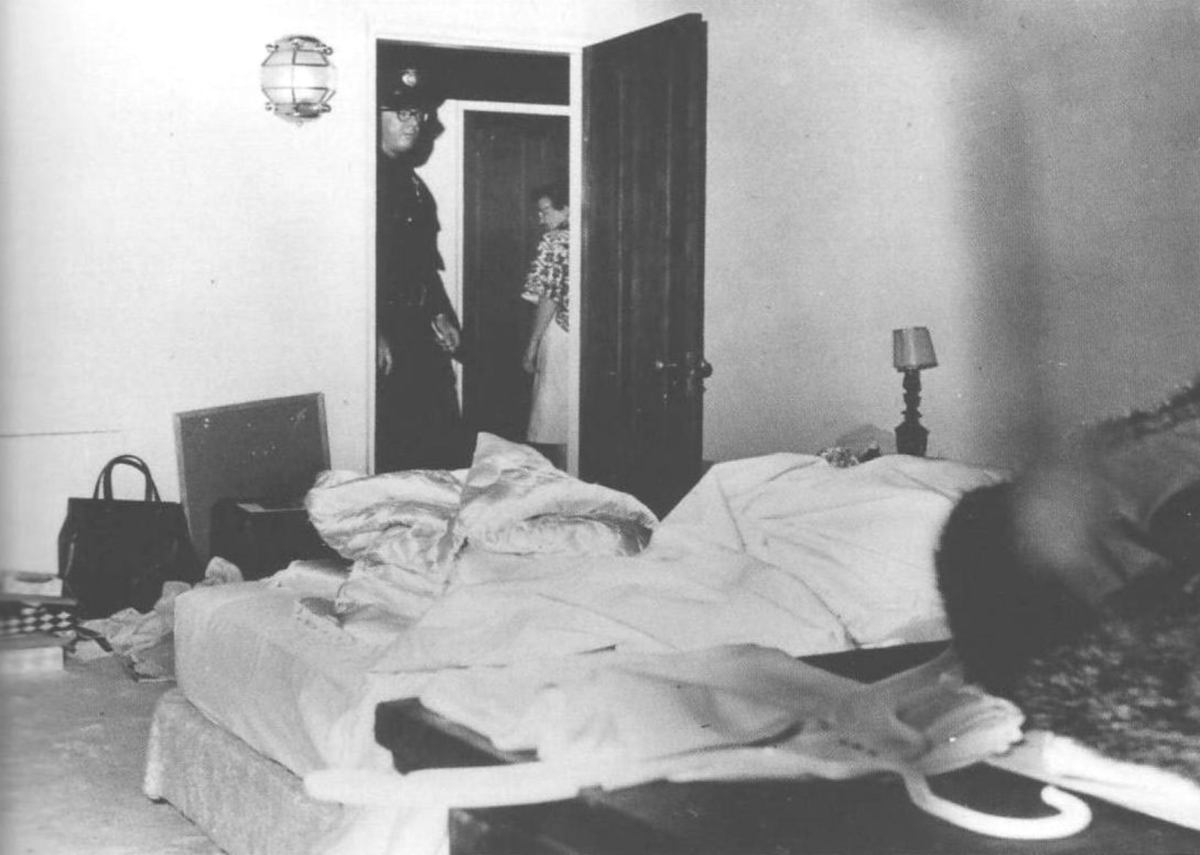Section 15
August the 5th in 1962
Fear and dread must have hung palpably in Marilyn’s living room as Los Angeles Police Officer, Sgt Jack Clemmons, a large and imposing fellow, entered just before sun rise on the morning of August the 5th, a Sunday. Doctors Greenson and Engelberg along with Eunice Murray, who opened the door for officer Clemmons, greeted him in silence.
Dr. Greenson directed the police sergeant to Marilyn’s bedroom and her lifeless body.
Marilyn was lying on her stomach, her obviously nude body partially covered by a sheet. Her head was turned to the right. Sgt Clemmons knew immediately, based on the her body’s appearance, that the movie star was dead. Dr. Greenson announced that Marilyn was clutching a telephone receiver when he had initially entered the bedroom; but the psychiatrist admitted that he had taken it from her hand. When questioned by Sgt Clemmons, Dr. Greenson denied that Marilyn’s body had been moved; and he denied any attempt to revive her. Marilyn’s psychiatrist then indicated the empty prescription vial of Nembutal among the many prescription containers resting on Marilyn’s small and cluttered bedside table. Written by Dr. Engelberg, Marilyn had filled the prescription for twenty-five 100mg Nembutal capsules just two days previous. Dr. Greenson commented: Marilyn must have swallowed all the pills the vial once contained.
Marilyn’s bedroom did not impress Sgt Clemmons. Apparently he expected to encounter a home, a bedroom more consistent with one occupied by a Hollywood movie star as famous and as popular as Marilyn Monroe, very large and obviously very expensive; in fact, the sergeant was not impressed by Marilyn’s hacienda at all. He would later describe it as cheesy. But then, the sergeant was not a Marilyn Monroe fan. If you want to know my reaction to her, it was completely negative, Sgt Clemmons informed Robert Slatzer during a 1974 interview; and then he also added that he did not admire women who flaunt their loose morals. I admire women who are feminine […] (Slatzer 290). Perhaps Sgt Clemmons’ profoundly negative attitude about the ostentatiously vulgar and unfeminine movie star darkly tinted and adversely affected his perception of the lamentable scene in Marilyn’s bedroom that sad Sunday morning.
Mrs. Murray was evasive, overly nervous and paced constantly, according to Sgt Clemmons, while Dr. Engelberg was forlorn and curiously quiet. Dr. Greenson, who did most of the talking, was arrogant and condescending; and his story of the morning’s events did not make sense. According to Sgt Clemmons, his question regarding an apparent time delay between the discovery of Marilyn’s body and when the doctors notified the police department received a strange response from Dr. Greenson: the publicity department at 20th Century-Fox had to be notified first. To Sgt Clemmons, that made no sense at all; and he quickly concluded that the psychiatrist was not telling the truth.
A faint strip of light visible beneath Marilyn’s bedroom door had concerned the housekeeper, or so she testified according to Sgt Clemmons. Then her knock on Marilyn’s bedroom door did not produce a response. Since Marilyn suffered from chronic insomnia and had difficulty falling asleep even under ideal circumstances, the housekeeper knew, Marilyn could not have been asleep with the bedroom light still burning brightly. Once again, Mrs. Murray knocked; and then she pounded on the door. Marilyn still did not answer, not even after Mrs. Murray shouted her name a few times. Eventually, the housekeeper tried to enter Marilyn’s bedroom, but the door was locked. Mrs. Murray’s concern then became alarm; so she immediately called Dr. Greenson.
The psychiatrist instructed Mrs. Murray to go outside and look through Marilyn’s bedroom window. Following Dr. Greenson’s instructions, Mrs. Murray walked outside with the fireplace poker in her hand. She used the steel tool to draw aside the dark drapery covering Marilyn’s barred but opened bedroom window. After doing so, she returned inside and telephoned Dr. Greenson a second time. She informed the doctor that Marilyn was nude, lying on her stomach across her bed and that she looked strange. Greenson, who had already started dressing after Mrs. Murray’s initial telephone call, quickly completed doing so and then drove to Fifth Helena Drive, just a short distance from his residence.
Immediately upon his arrival at Fifth Helena, Dr. Greenson entered the house and attempted unsuccessfully to arouse Marilyn by pounding on her bedroom door. Obviously, something was wrong; he took the fireplace poker outside and drew aside the drapery just as Mrs. Murray had done. He then went to the nearby casement window and broke a pane so he could reach inside, unlatch and roll open the sash. After he squeezed himself through the narrow opening, he approached Marilyn. When he saw her darkened hue, he knew immediately that she was gone. Dr. Greenson must have pulled the sheet over Marilyn’s body before he unlocked the bedroom door so Mrs. Murray could step into the bedroom. As she did so, nervously and only partially, Dr. Greenson announced: We’ve lost her. The psychiatrist then instructed Mrs. Murray to telephone Dr. Engelberg. Even though Dr. Greenson knew Marilyn was dead, even though the psychiatrist was also an MD and could have formally pronounced his famous patient dead, he apparently believed that Dr. Engelberg should make the formal declaration. Since the internist had left his wife earlier that day, Mrs. Murray had to locate him, which she finally did in a nearby apartment he had only recently leased. Not long after Mrs. Murray’s telephone call, Dr. Engelberg arrived.
Despite Hy Engelberg’s many professional accomplishments, he may well be remembered for the famous telephone call he placed at 4:25 AM to the Los Angeles Police Department that grim morning. He informed Sgt Clemmons, who just happened to be the Watch Commander that morning and answered the telephone: Marilyn Monroe has died. According to The Washington Post, Marilyn’s internist added: She’s committed suicide. I’m Dr. Hyman Engelberg, Marilyn Monroe’s physician. I’m at her residence. She’s committed suicide.1“Hyman Engelberg”. The Washington Post.
22 Dec 2005.
<https://www.washingtonpost.com/archive/local/2005/12/22/hyman-engelberg/6f6cfe27-116c-4c5a-9961-86abca8bba3f/>Sgt Clemmons was skeptical, he stated; and as a result of his skepticism, he decided to drive to Fifth Helena and investigate for himself. After all, the call could have been placed by some hoaxer, some teenage kid hoaxer playing a joke on the dumb and gullible COPs. When the sergeant entered Marilyn’s hacienda, the time was 4:35 AM on August the 5th.
